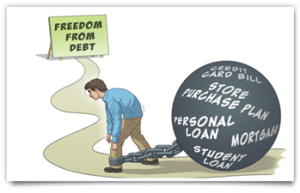Pennies Today, Dollars Tomorrow: How Compound Interest Grows Your Debt
 How much will you pay in interest this year? Few borrowers realise the implications of compound interest on their debt when they sign on the dotted line. While a few percentage points may seem like a trivial technicality, the interest on your loan is compounding every day– and so is your debt.
How much will you pay in interest this year? Few borrowers realise the implications of compound interest on their debt when they sign on the dotted line. While a few percentage points may seem like a trivial technicality, the interest on your loan is compounding every day– and so is your debt.
Simple versus Compound Interest Calculations
Simple interest accrues only on your principal, which is the actual amount that you have borrowed from a lender, be it via a credit card or a home loan. In simple interest calculations, your interest rate is percentage of the principal on your debt. An APR, or Annual Interest Rate, of 15% on a principal of $100 would accrue $15 of interest charges over the life of the loan in a simple interest calculation.
Compound interest involves a continual recalculation of the amount that you owe the lender. For the $100 that you charged on a credit card with an APR of 15%, your daily interest rate will be approximately 0.041%. This is because the amount of interest will compound, or be recalculated, based on your balance each day. On Day 1, you will accrue $0.41 in interest charges, bringing your new balance to $100.41. On Day 2, your interest will be calculated based on a balance of $100.41 and you will accrue an additional 42 cents of debt, bringing your new amount owed to $100.83. This will continue each day until the balance is paid in full.
While most credit card companies and similar lenders offer a grace period in which the borrower may pay the balance in full to avoid any interest charges, making only the minimum required payment means that the remaining balance will begin to accrue interest immediately.
The Exponential Growth of Your Debt
Almost all lenders use compound interest calculations when you borrow money. This has profound implications on your debt. While the initial 41 cents of interest on your $100 charge seems innocuous enough, over the course of a year your debt will grow exponentially. If you make a minimum payment of $10 each month, it will take you 11 months to pay down your debt, costing a total of $107.50. Now consider if you miss a payment and have late penalties applied to your account, causing you to take months longer to pay the balance in full. It isn’t hard to see why several thousand dollars or more of debt would quickly become an insurmountable burden.
In November 2012, the average credit card debt per borrower in the US was almost $5,000. Student loan debt for undergraduates was a staggering $27,000 after leaving college, with professional students owing over $79,000. Compound interest rates will cause the debts to soar even higher, with many borrowers ultimately paying tens of thousands of dollars more than their principal.
Stop the Climb! Solutions to Help You Get Out of Debt
The key to limiting the growth of your debt is controlling the interest compounding on your debt. Debt consolidation loans offer a means to do just that. By consolidating all of your debt into one loan, you will pay interest on only one loan. More of your monthly payment will pay off the principal, allowing you to pay down your debt more quickly.
A debt consolidation loan is not a magic bullet. A realistic budget and the discipline to stick to it are crucial parts of any debt elimination plan. But they do offer a way to slow the exponential growth caused by compound interest, allowing you to regain control of your finances. Getting out of debt is a difficult undertaking; debt consolidation can simplify the process.
Katie Latchford is a freelance writer who has a keen interest in financial matters such as how to ease your financial situation by applying for a debt consolidation loan to help you to manage your debt more effectively.
















